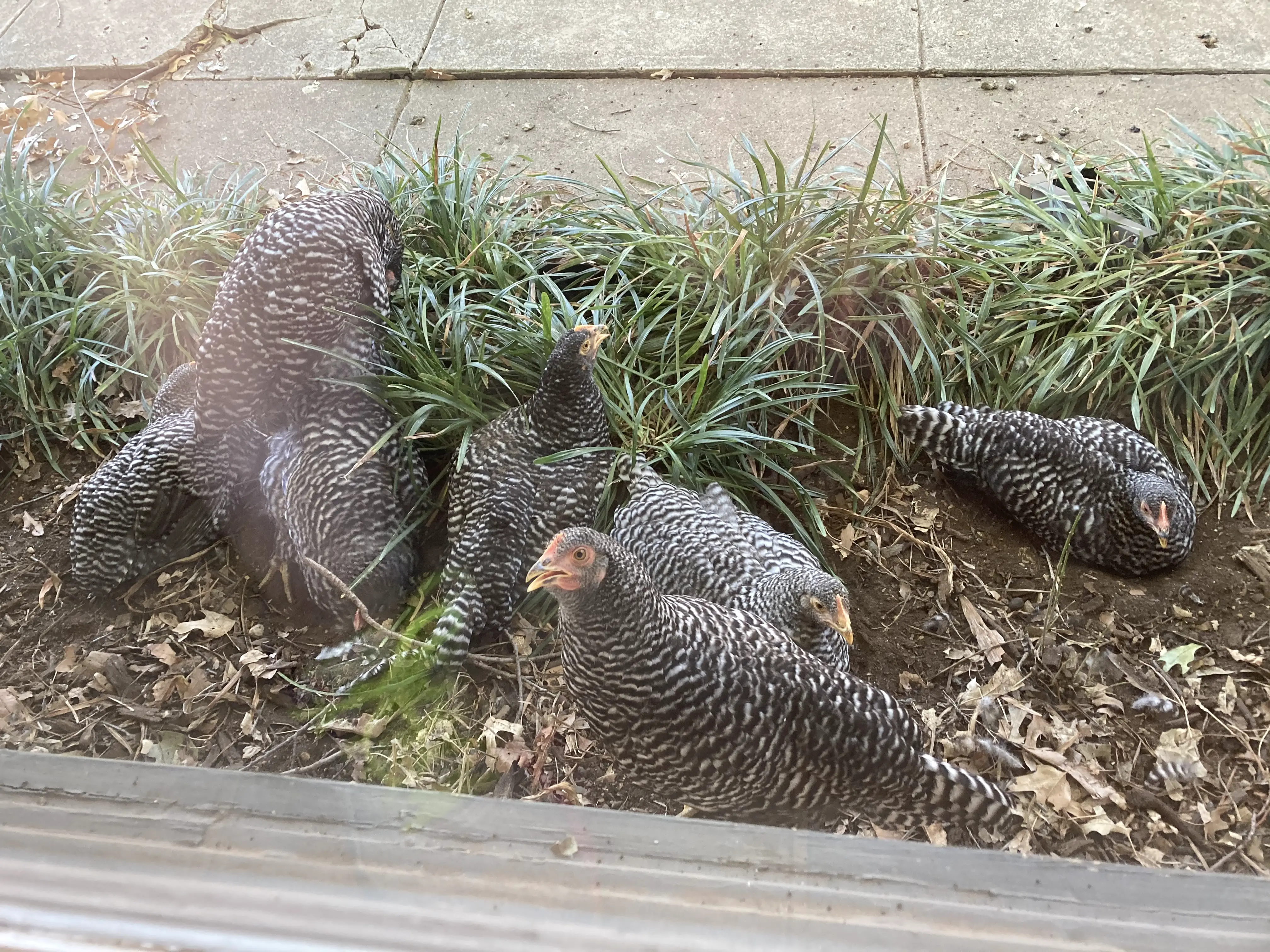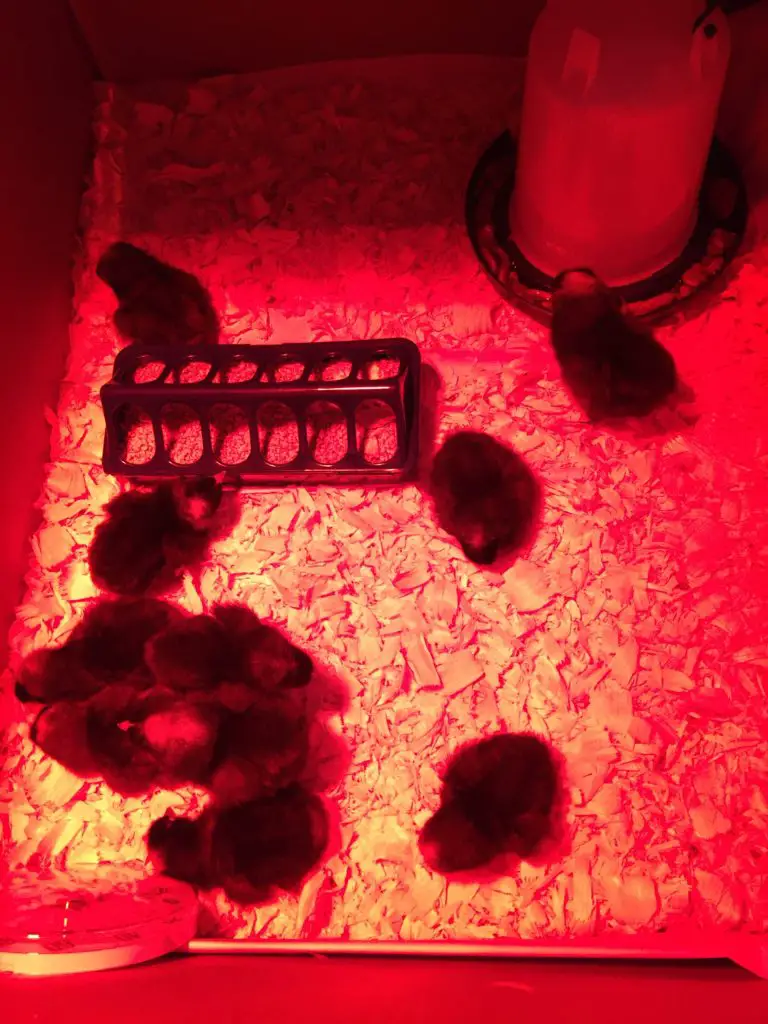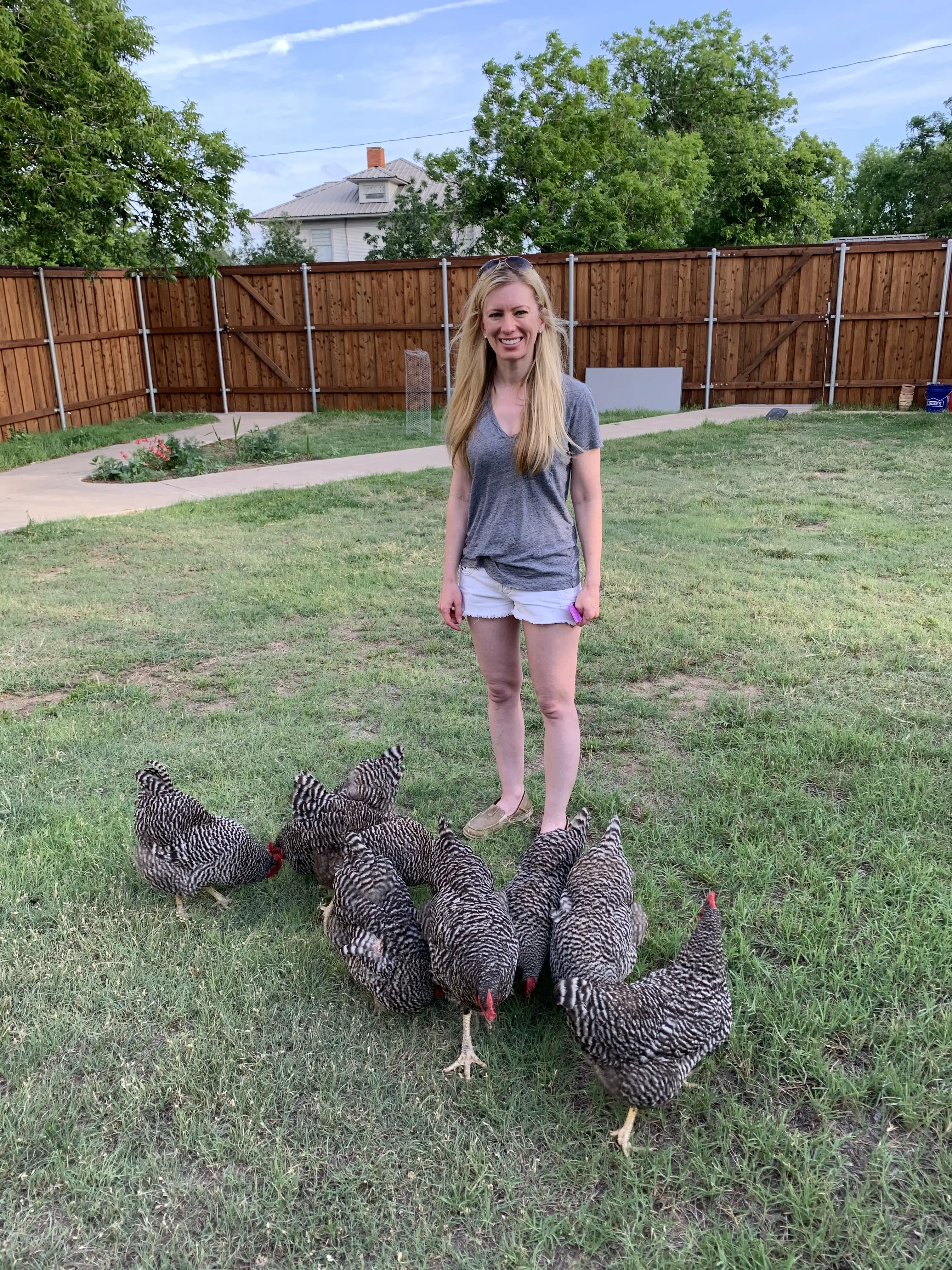Raising backyard chickens has become popular in recent years. Up until the 1950s it was just a way of life for many people to have chickens in their yards that they raised for eggs and meat. My great-grandparents had chickens on their farm, along with other livestock, as a food source. However, today’s backyard chicken keepers view their chickens more as pets than livestock and would never eat them. As more and more people decide to take the jump and raise backyard chickens, there are many real reasons for not getting chickens.
Chickens are poultry, a type of domesticated bird used for food. They require daily care and management to maintain their health and can be forbidden in certain neighborhoods. Chickens should not be raised by people who cannot regularly manage their care.
I ask you to keep reading to understand some of the realities with raising backyard chickens.
1. Raising Chickens is Expensive
I recently wrote a post about the cost of raising chickens in your backyard. On average, it costs $603 per year and $1,830 in one-time expenses to raise a flock of 5 – 10 chickens. These numbers are very realistic, but can vary depending on your circumstances, like whether you already have a building for a chicken coop.
| Item | Cost |
|---|---|
| One-Time Costs – Chicken coop, chicken run | $1,700 |
| Additional One-Time Costs – Adoption fees, feeding supplies | $130 |
| Necessary Repeat Expenses – Food, supplements, bedding | $439 |
| Additional Repeat Expenses – Scratch, grit, egg collection supplies | $164 |
| Total | $2,433 |
The most expensive cost for most people will be the chicken coop. We started off with a DIY chicken coop, using leftover building materials. It looked terrible and we had to crawl inside the chicken coop in order to collect eggs. When we moved to a new house, we decided to upgrade the chickens’ home and buy them a nice coop. It cost several thousand dollars but it was worth it since it functions much better than our DIY coop.
You will also need to consider the expense of building a run, or caged enclosure, for your chickens to stay in during the day. When we are not home, the chickens stay in their run instead of free ranging. We do this for their safety and also to keep them out of the garden. There are kits you can buy for the run or you can make your own with fencing materials. Either way, this can be another large cost when raising chickens.
2. Chickens Require Care Everyday
Chickens will require care every single day. Chickens sleep in a chicken coop during the night. As soon as there is sunlight in the morning, the chickens will need to have their coop door opened. At dusk, the chickens will go into their coop for the night and the door will need to be closed. There are automatic door openers that some people use, but I think this takes away from the connection you have with your flock.
When chickens reach an age where they lay eggs, typically at 4 to 5 months, the eggs will need to be collected at least once a day. During hot weather I like to collect the eggs more frequently (in the morning, at lunch, and again when I close their coop for the night), to keep the eggs fresh and prevent them from getting too hot. When it gets below freezing during the winter, eggs should be collected regularly to prevent them from freezing or cracking.
During the day, I will periodically check on my chickens. I was at home one afternoon last week and looked out the kitchen window to check on the chickens in their run. I saw a neighborhood cat right outside their run, trying to hunt my birds! The cat could not get into the run but I ran the cat off so he wouldn’t stress out my chickens.
With all this daily care, it is very difficult to leave town on the weekends without having a plan in place first. You will need someone who can take care of your chickens while you are gone and who you can count on to ensure that all the chickens are in the coop at night before closing the door. If you have someone care for your chickens, make sure your chickens have met them beforehand. My chickens are pretty friendly in general, but when they know that a person has been introduced to them by me, they are much more accepting of them.
Keep in mind that you also need to plan in advance if you will be coming home after dark. There have been times when we had to run home before it got dark to put up the chickens. My husband’s family has never been around chickens or livestock so this concept was new to them. They absolutely could not understand why we had to leave by a certain time to put up the chickens. This is totally for our chickens’ safety and is not up for discussion, thanks and have a great day.
3. Chickens will Destroy Your Yard
Chickens will destroy your lawn, garden, flower beds, and potted plants. I know from experience.
When we first got our chickens, we let them run around the entire yard all day long. The backyard didn’t have much grass, only weeds, so it didn’t bother us too much. Wherever there was a bare spot on the ground where we were trying to grow grass, the chickens would dust bathe and make the bare spot larger.
It doesn’t take much time for chickens to scratch in a garden or flower bed and totally destroy the plants. We let the chickens free range this past weekend. It’s been hot and we wanted to let them scratch around in the shade under the trees. When we went to check on them a few hours later, my husband, Steven, found that a quarter of his potato plants had been knocked over. The chickens decided that the dirt in the tall potato plants would be great for dust bathing all afternoon and had trampled on the plants.
Planting flowers in pots will not deter chickens either. I had some geraniums in a nice talavera planter and some mums in some plastic planters. The chickens thought that roosting on both of these planters was great fun and before long they were sitting on the plants. Every single one of the plants had to be replaced.

Chickens scratch the ground to get insects and find seeds to eat. This is good exercise for them and is an instinctual behavior that starts at just a few days old. The best way to keep chickens out of your plants and garden is to install fencing. This costs money and depending on your yard it might not be aesthetically pleasing to have additional fencing.
4. Have to Protect Chickens Constantly
When my chickens are kept in their run during the day, they are mostly protected and safe. However, chickens need exercise and to eat insects and plants from the yard so we let them free range several times a week. When chickens free range, they are exposed to many predators.
Aerial predators include hawks, such as red tailed hawks and Cooper’s hawks, owls, and eagles. Usually, younger chickens are at greater risk of being attacked by a hawk since they are smaller and make easy prey. However, a bold juvenile hawk might try his luck at hunting an adult chicken.
A few days ago, I looked out the kitchen window and saw a bunch of gray feathers in the yard. As I got closer to the window, I saw a juvenile red tailed hawk sitting on top of a dove. The small hawk struggled a few minutes with getting a good grip on the dove before he flew off. The only thing left after a hawk carries off a chicken will be a few feathers, similar to what happened to this dove.
It’s important that chickens have a safe place to hide when they are allowed to free range. I always keep the chicken coop door open in case the birds need to hide in the coop. There is also a row of bushes along the garage and back fence line that serves as cover from a flying predator.
On the ground, there are predators such as dogs, raccoons, and skunks. Raccoons and skunks are more likely to go after eggs but they will attack chickens if given the opportunity. A friend of our’s had a horrible experience where a raccoon grabbed some of their chickens through a gap in the coop one night. The poor chickens were mangled but survived the ordeal.
While the raccoons and skunks are nocturnal, dogs will attack chickens at any time of day. Unfortunately, some dogs view killing chickens as entertainment and will attack an entire flock indiscriminately. Make sure the fencing in your backyard will keep out marauding dogs and cannot be easily breached, including attempts to dig holes under the fence.
To protect chickens from ground predators, the chicken coop needs to be constructed in a way that keeps out prying claws. There should be no hole in the coop larger than half an inch. A hole larger than this allows a rat or least weasel to enter and they will eat the chicken eggs or baby chicks. Any openings in the chicken coop need to have half inch hardware cloth covering them to prevent predators from ripping the screen or squeezing through the holes.
Chicken wire should not be used to protect your chickens! This is more useful as temporary fencing and will not keep a predator out. Hardware cloth is much more sturdy and cannot easily be chewed through or torn apart.
Many chicken coops are designed to be several inches off the ground to prevent digging predators from entering the coop. Our chicken coop has a solid floor as predator prevention so that it won’t be easy to claw through to get to the chickens.

5. Chickens are Noisy (hens included!)
Before I got my chickens, I never considered that they could possibly be loud. I thought only roosters made noise and we were only getting hens so there would be nothing to worry about. Well, was I in a for shock!
Chickens are vocal animals and make noises all day long. When chickens are content, like when they’re scratching the ground, they will make a chirpy sound that I compare to a cat’s purr. Some chickens will let out an “egg song” before and/or after laying an egg. I’ve noticed that when one of my chickens does this egg song, a few of the other hens will join in and it will get pretty loud for several minutes up to half an hour.
When my chickens have had enough of their run and they are ready to get out in the yard, they will let me know by squawking loudly. While writing this post, I heard quite the commotion in the backyard. When I went out, everything looked fine: they had feed, fresh water, there were no cats, and nobody was being bullied. I watched them for a few minutes and could tell they were acting restless, pacing back and forth in their run. When I opened their run into the extended run (this is a new addition to their run that is a fenced in area with no cover), all the chickens ran out and the squawking stopped.
I have also had a chicken hiss at me, like a cat. One of my chickens was about 5 or 6 months old and when I walked by her, she hissed at me! I’m not sure if I had gotten too close or she was just testing it out, but it sure did catch me off guard. Chickens will hiss when they feel threatened or want you to back off. And it definitely sounds like a hiss, so if you hear it someday you will know without a doubt that they hissed.
Some neighborhoods or subdivisions have deed restrictions that prohibit residents from owning or raising chickens. They do this to maintain a certain look to the neighborhood and don’t want chicken coops in the yards. The country club in town has houses that back up the golf course and those people would be offended to see chickens in someone’s yard while golfing. I think this is ludicrous, which is why I don’t live in a neighborhood like that.
Another reason for deed restrictions prohibiting chickens is due to the noise. In my opinion, chickens are no louder than a neighbor’s barking dog or screaming toddler. When chickens are well cared for and not stressed, they are usually quiet. Some of our neighbors enjoy hearing the chickens, some not so much, and others have no idea that we even have chickens in the backyard.
6. Have to Deal with a Lot of Poop
Chickens eat all day long, and that means they poop all day long. When our chicks were still in their brooder in our spare bedroom, the bedding in the brooder had to be changed every week because it would get smelly. That’s the main reason we were so glad to get them moved into their coop was because I couldn’t handle their odor. I started calling them my “smelly birds.”
Chickens sleep on roosting bars at night and they will poop all through the night. Right before it gets dark at the end of the day, chickens will go on a foraging spree and eat like teenagers. This food will then be digested at night when they are sleeping safely in their coop. The area beneath the roosting bars has the most poop, which is why you should never store food or water in that area.
When I let the chickens out of the coop in the morning, they will hop out of their coop and take giant poops in the run. I’m not sure if they were holding it in until I let them out. Also, broody hens will have giant poops because they will usually only get off the nest a few times a day to eat and defecate.
Depending on the weather (if its hot) or what the chickens have eaten, they can have runny poops. A normal, healthy chicken poop is a black ball with a white cap.
When chickens are very young, you need to be inspecting their downy butt feathers every day to make sure they don’t get a build-up of poop. This is called pasty butt, or sticky bottom, and can be lethal to baby chicks. One of our chicks had a build-up of poop and Steven and I washed her off with warm water in the sink. I’ve noticed that she still continues to be the one chicken who occasionally gets runny poop on her butt feathers as an adult.

All that chicken poop is great for the compost pile and will help your garden and flowers grow naturally, without the use of chemicals. Some people will use the deep litter method in their dirt floor chicken coop, which uses the scratching and manure of the chickens to turn the bedding into ready-to-use compost. Other people, such as myself, will just toss the used bedding into the compost pile and let it sit there until it’s ready to be added to the garden.
7. If You Don’t Like Animals
The final reason to not get chickens is pretty obvious: if you don’t like animals, then please don’t get chickens.
Chickens are intelligent animals and require enrichment activities; otherwise, they get bored which leads to many issues. When chickens are bored, they will squawk loudly or peck at each other. This can increase the stress levels in the flock, which leads to decreased egg production. Feeding chickens a head of lettuce on a rope (like a tether ball) or adding new tree branches to climb on helps to reduce boredom with chickens that stay in a run most of the day.
Many breeds of chickens are friendly and enjoy their people. Our chickens love interacting with us and will follow us in the yard if we’re working on something. They look at me sweetly when I talk to them and tell them how they are such “good chickies.” I think they’re a bit of a mix between a dog and a cat. Like a dog, my chickens will run up to me in the yard and will stick around me if they think I’ve got food for them. But like a cat, once they have their fill of me, they leave and don’t want any additional attention.

If you can’t see yourself working with the chickens everyday, then you are not the right person to be raising backyard chickens. I have talked to people before who think they want chickens, but then are grossed out by the poop or don’t want to give up leaving town every weekend. Chickens are a responsibility but they provide so much entertainment, companionship, and of course, fresh eggs!

